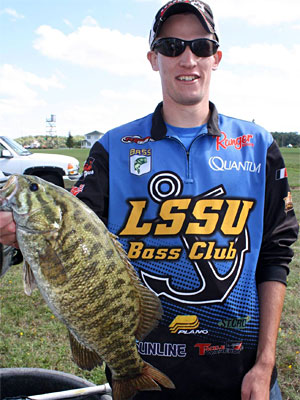Every young tournament angler shares the same dream – making it pro. But in today’s world this dream is often laughed at by society. I have had countless people tell me “that isn’t realistic,” or that I’m full of myself for thinking I could ever become a professional.

Nate Sleight is currently a senior at LSSU studying fisheries management, and the president/co-founder of the Lake Superior State University Bass Club.
Every young tournament angler shares the same dream – making it pro. But in today’s world this dream is often laughed at by society. I have had countless people tell me “that isn’t realistic,” or that I’m full of myself for thinking I could ever become a professional.
Competitive bass fishing is extremely competitive obviously, and it is increasingly challenging to compete at the highest level. It takes a special kind of person who has a profound understanding of the business aspect, public relations, and most obviously the ability to consistently catch fish. For those of us who block out the “you cant’s” there’re still huge obstacles in front of us. What steps do you even take??
At some point we have all found ourselves trying to email companies for sponsorships and support, but as we know this is a horrible approach. So we keep looking for other outlets, and stumble upon college fishing. This happened to me my sophomore year while attending Lake Superior State University in Sault Ste. Marie, which is in Michigan’s Upper Peninsula. I don’t know how familiar you are with the UP but it’s not really known as a place to go bass fishing (side note, it’s amazing). Being a small university there was no team, but with hours and hours of paperwork and support from a few other dedicated students we were able to successfully put together a college fishing team (not to brag, but student organization of the year).
Collegiate fishing offers young anglers a chance to make it to the big time and minimizes the costs in doing so. Is it still expensive? Yes, it can be costly still, but with more and more companies offering support to college fishing teams this cost is becoming more manageable. Our club is able to fish in tournaments all over the country fishing in B.A.S.S., FLW, and the ACA.
The opportunity to fish in huge tournaments on some of the best lakes in the country is an obvious draw to students as well as the high quality gear at premium prices. However, more importantly than having a chance to make it big college fishing has given me the ability to talk to people.
I have always been an outgoing and talkative person, but that’s not what I mean. When I say talk to people I mean be able to communicate with other anglers about real issues, talk with companies about sponsorships, speak with school officials about marketing/funding, and tell people why college fishing is more of a sport than tennis. Basically it has given me all of the skills that most young anglers don’t even consider when thinking about professional fishing. The top pros in the world catch more people than they catch fish.
Overall I recommend every serious young angler pursue a college fishing team. It’s a great way to learn and practice new techniques, acquire people skills, be excused from class to fish, have fun, and meet lifelong friends. Not to mention there is a possibility to achieve that dream status and join the ranks of the elites. In my last year of college fishing I’m as focused as ever for the tournament season, but even if I don’t win any major tournaments this year college fishing has only increased my drive to make it.
Check us out on Facebook at: Lake Superior State University Bass Club or Twitter: @LSSUBASS.
 About Nate Sleight
About Nate SleightI currently am a senior at LSSU studying fisheries management, and am the president/co-founder of the LSSU Bass Club. I have lived in Sault Ste. Marie for a few summers now and the bass fishing up here has been better than I could have ever imagined. Originally I grew up on Wixom Lake chasing largemouth back and forth along the seawall, and had the dream of fishing in the elites as long as I can remember. After I graduate I’m looking to further my education in fisheries and eventually work as a fisheries biologist, all the while working at taking fishing to the next level.

